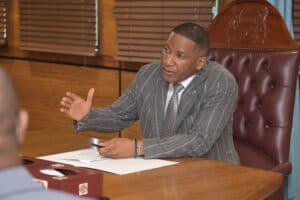The Gaborone high court on Tuesday ruled sections of Botswana’s Penal Code, which criminalise same-sex sexual conduct, unconstitutional.

Botswana’s high court, in a highly anticipated verdict, on Tuesday ruled to decriminalise homosexuality, which was outlawed under the country’s 1965 penal code.
Judge Michael Elburu “set aside” the “provisions of a Victorian era” and ordered the laws be amended.
Certain sections of the penal code imposed a maximum sentence of seven years’ imprisonment for consensual same-sex relations. The court, however, ruled these provisions “discriminatory because they take away the only means of sexual expression of the applicant”.
According to Christian Science Monitor correspondent Ryan Lenora Brown, who was at the court on Tuesday, judge Michael Leburu said that it was “not in the public interest” to criminalise same sex sexual conduct. “What compelling public interest is there necessitating such a law? There is no victim.”
“The state cannot be sheriff in people’s bedroom,” added the judge.
In March, the court postponed a ruling on the issue after an unnamed applicant challenged two sections of the penal code under which offenders face a jail sentence of up to seven years.
Activists were hoping the government would do away with the oppressive laws that brand homosexuality ‘unAfrican’.
“If this law is decriminalised it will be a positive thing for the community because it will protect their right to privacy and their right to express themselves the way they feel,” Matlhogonolo Samsam from Botswana’s lesbian, gay and bisexual organisation (LEGABIBO) told AFP.
Activists launched the legal battle after the Home Affairs ministry rejected an application to register LEGABIBO.
For outreach worker Thato Game Tsie scrapping the anti-gay laws would help the community access health care and treatment more easily.
“There are many services we require as gay men that some nurses are not aware of, and if we go to a government hospital there will be those negative comments said to you,” Game Tsie told AFP.
“So we just want to be free to access these services. I think it will be a great disappointment if we lose this,” he said.
Anti-homosexuality laws
Last month, Kenya’s High Court refused to repeal laws criminalising homosexuality despite activists’ hopes that it would follow the example of some African countries like Angola, or those further afield like India, and end decades-old laws which criminalise gay sex.
At the Botswana high court hearing in Gaborone in March, lawyers for the applicant said public opinion on same-sex relationships had evolved and employment laws now outlaw discrimination on grounds of sexual orientation.
In 2016 the country’s appeals court ruled that the government was wrong to refuse to register an organisation representing homosexuals and other minority sexual groups.
President Mokgweetsi Masisi had addressed a meeting on gender-based violence, saying there are “many people of same sex relationships in this country who have been violated and have also suffered in silence”.
“Just like other citizens, they deserve to have their rights protected,” he told the December gathering.
According to watchdogs, more than half of the countries in sub-Saharan Africa have anti-homosexuality laws, although others have moved towards legal tolerance.
Angola, Mozambique and Seychelles have scrapped anti-gay laws in recent years.
READ NEXT: Anti-gay laws widespread in Africa despite gains
For more news your way, download The Citizen’s app for iOS and Android.






